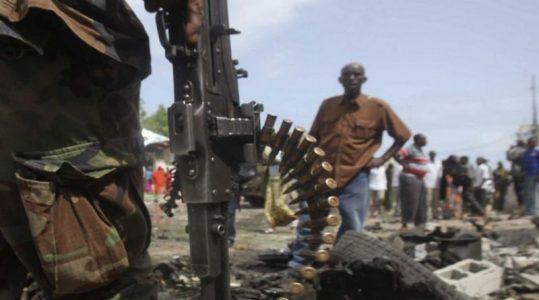
How Boko Haram terrorists fund their evil actions?
If there was an exact moment the international community understood the breadth of Boko Haram’s evil, it came on May 5, when the group’s leader grinned and announced he would sell 200 kidnapped schoolgirls in his “market of selling human beings.”
It was day. He was surrounded by masked minions. And behind Abubakar Shekau, a man who rose through Boko Haram’s ranks through unmatched brutality and religious fanaticism, loomed several armored vehicles. Local experts said the video was likely shot in the remote Sambisa forest in northeastern Nigeria — and the juxtaposition between the bucolic settings and the high-tech machinery made a jarring contrast.
Despite the poverty of northern Nigeria — where 70 percent of people live on less than a dollar per day — the Boko Haram terrorist group has at its disposal a seemingly limitless amount of heavy weaponry, vehicles, bombs and ammunition that it uses to kill with unfathomable wantonness.
The Islamic militancy, masquerading as members of the military, raided three villages in northeastern Nigeria this week and mowed down 400 villagers “from house to house” using “sophisticated weapons,” one local leader told Bloomberg.
Dozens more members of Boko Haram arrived at another village disguised as preachers and assembled the entire of village of Bargari ostensibly to teach Islam. Once gathered, “another large number of terrorists came from nowhere and opened fire on the congregation,” one resident told Nigeria’s Daily Post. “The gunmen numbering 20 ambushed the village with four Toyota Hilux vehicles, AK47 rifles, improvised explosive devices, and petrol bombs.”
How is Boko Haram paying for all this? Who would finance this campaign of slaughter?
According to a survey of academic, governmental and journalistic accounts, Boko Haram funds its escalating acts of terror through a diverse network of black market dealings, local and international benefactors, and links to al-Qaeda and other well-funded groups in the Middle East. Analysts say its fundraising apparatus is intricate and opaque. “The actual source of the funding,” wrote Heather Murdock in Voice of America, “is as elusive as the militants themselves.”
The story of Boko Haram’s fundraising begins after the terrorist attacks on the World Trade Center and the Pentagon. In 2002, the group’s original leader, a charismatic cleric named Mohammed Yusuf who was later killed, founded the group as an alternative to Western education, which he claimed undermined Nigeria’s development.
Around that time, Osama bin Laden sent an aide to Nigeria with $3 million in local currency to dispense among groups that shared al-Qaeda’s mission to impose Islamic rule. One of the “major beneficiaries,” reported the International Crisis Group, was Boko Haram.
“We are not saying all $3 million went to Boko Haram,” an author of the report told the Daily Beast. “What I can tell you from talking to lots of conservative Muslims in Nigeria is that there was a lot of money coming into northern Nigeria, there are many sources of that money. One of those sources was from al-Qaeda.”
The connection between Boko Haram and al-Qaeda — and its money — perhaps deepened when Yusuf fled to Saudi Arabia to escape one of Nigeria’s first crackdowns on the terrorist group. It’s unclear what happened while the group’s founder was in Saudi Arabia or whom he met, but Boko Haram leaders later said that much of their funding comes from al-Qaeda.
“Al Qaeda are our elder brothers,” a Boko Haram spokesman told the Guardian in its first major interview with a Western newspaper. In August 2011, he said, “Our leader traveled to Saudi Arabia and met al-Qaida there. We enjoy financial and technical support from them. Anything we want from them we ask them.”
But even such alleged financial connections with al-Qaeda does not explain Boko Haram’s money. Like a river sucking water from many tributaries, Boko Haram draws funding from other sources as well. The group reportedly also gets cash from Islamic terrorist groups such as al-Shabaab in Somalia and local al-Qaeda affiliates.
“Each of those three organizations is by itself a dangerous and worrisome threat,” Carter Ham, head of the U.S. military’s Africa Command, said in 2012. “What really concerns me is the indications that the three organizations are seeking to co-ordinate and synchronize their efforts – in other words, to establish a co-operative effort amongst the three most violent organisations … And I think that’s a real problem for us and for African security in general.”
Then there’s the black market money. Beyond a hatred of Western education, economic motives may have also driven Boko Haram’s recent abduction of the schoolgirls. A robust and terrifying slave market hums in Nigeria and neighboring countries. “Kidnapping has become one of [Boko Haram’s] primary funding sources, a way to extract concessions from the Nigerian state and other governments, and a threat to foreigners and Nigerian government officials,” according to West Point’s Combating Terrorism Center. It is worth “millions of dollars in ransom money.”
Boko Haram, for example, was paid $3 million when it freed a French family last year. Then this week, it released an Italian priest and a Canadian nun “as part of a prisoner exchange with a fee being paid,” an anonymous source told Agence France-Presse. (Canada disputed that allegation.)
According to Terrorism Research & Analysis Consortium, bank robberies also account for $6 million of the group’s wealth.
Experts agree that one of the best ways to stall Boko Haram is to cut off its funding. But how to do that isn’t clear. The group is an entrenched part of life in northern Nigeria, possessing control and influence, and even collecting taxes.
“Poor people are tired of the injustice, people are crying for saviors and they know the messiahs are Boko Haram,” a group spokesman told the Guardian. “People were singing songs … saying: ‘We want Boko Haram.’ … If the masses don’t like us they would have exposed us by now. When Islam comes everyone would be happy.”
Source: WP





